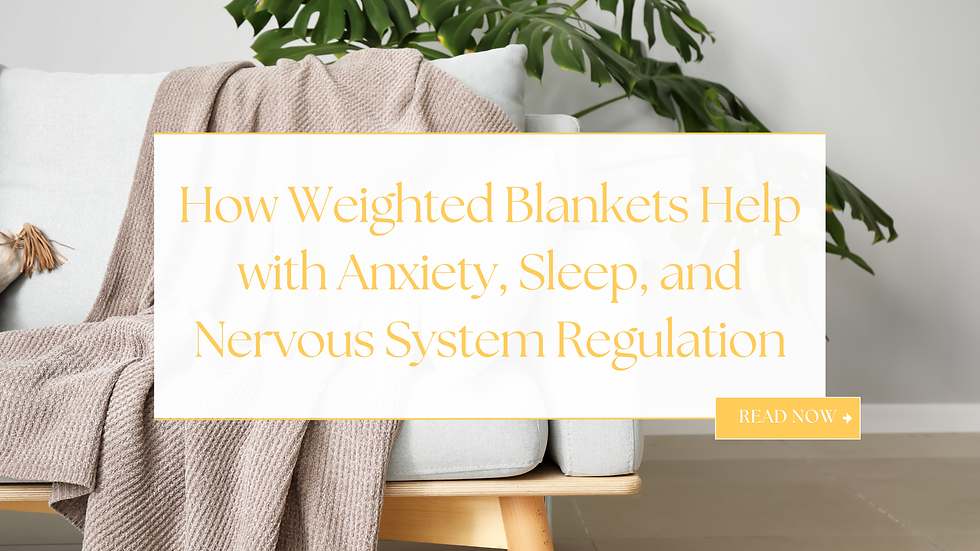Ice Baths and The Nervous System: Why Cold Therapy Isn’t for Everyone
- Laura Lee Peters
- Nov 7, 2025
- 3 min read

You’ve probably seen it all over social media — people plunging into icy tubs, smiling (or shivering) through the pain, and claiming they’ve unlocked the secret to superhuman health. And while there are some real, science-backed benefits to ice baths… they’re not for every body.
Let’s chill out (pun intended) and explore why cold plunging might not be your best next move — especially if your nervous system is already stuck in freeze mode.
The Very Cool Benefits
Some of the possible benefits of ice baths include:
Reduced inflammation – Cold constricts blood vessels, which can help lower post-workout swelling and soreness.
Boosted mood & energy – Cold exposure releases norepinephrine, a neurotransmitter that increases alertness and focus.
Improved resilience – It can train your body to adapt to short-term stressors, helping to build your stress tolerance over time.
Better circulation – Alternating between cold and warmth supports vascular health and detoxification.
Endorphin rush – That euphoric post-plunge high? That’s your body’s natural painkillers kicking in.
When “Freeze Mode” Isn’t Just About Temperature

If your body already lives in the freeze or shutdown state (think burnout, emotional numbness, brain fog, low motivation, long-term complex trauma), throwing yourself into icy water can actually reinforce that freeze state.
Your body doesn’t know the difference between a biohacking trend and a threat — if you're body is in the freeze and or shutdown state, it will register the ice as “we’re under attack.”
So instead of creating resilience, it can deepen dysregulation, leaving you more tired, dissociated, or anxious afterward.
In short: if your nervous system is already frozen, you don’t need more ice. You need warmth, safety, and gentle reactivation.
Let’s Talk About Hormones (Especially for Women)
Something else that you need to know is that the rules of ice baths change a bit if you're a woman.
Cold plunging during certain phases of your menstrual cycle — especially the luteal phase (after ovulation) and the menstrual phase — can negatively affect hormone balance. That’s because cold exposure can increase cortisol levels (one of your stress hormones), which can suppress progesterone production. Ice baths also lower basal body temperature, which disrupts natural rhythms that support fertility, mood, and metabolism. When done during your menstrual cycle, they can potentially worsen cramps and or PMS symptoms.
So if you're a woman and you're thinking about doing a cold plunge, wait until you're ovulating.
Who Ice Baths Serve Best

Those with high stress levels but relatively balanced nervous systems who are looking for a challenge.
Athletes looking to recover after intense training.
People who are experiencing a lot of anger and frustration
People looking to improve their circulation
People who are looking to become more resilient to stress over time
Who They’re Not For
Anyone dealing with burnout
Those with low thyroid function or adrenal fatigue
Women during their luteal or menstrual phases
People with low blood pressure, poor circulation, or cardiovascular issues
The Warmer Path to Regulation
If you’re craving nervous system support but ice baths aren't the right fit for you, try these gentler (and equally effective) alternatives:
Warm baths with Epsom salts or essential oils.
Gentle shaking, breathing exercises, or gentle movement to slowly thaw out the body.
Sauna or infrared therapy
Grounding practices like walking barefoot, humming, or vagus nerve toning.
Your body doesn’t need to be shocked into healing — it needs to feel safe to return there naturally.
Final Takeaways

Ice baths aren’t good or bad — they’re just better for some people than they are for others. If you’re already living in a state of chronic stress, cold plunges might end up keeping your body frozen in survival.
But when your system is relatively balanced and supported, the cold can become a teacher — showing you how strong, adaptable, and resilient you really are.
The secret? Listen to your body before following the trend and do your research to make sure that they're the right fit for you. Sometimes the real magic isn’t in the ice… it’s in the warmth.
Other Ways That You Can Support Your Nervous System
If you're looking for a fun, simple way to de-stress, or to reduce your symptoms of chronic stress and anxiety, my mini course The Feelings First Aid Kit is here to help :D

If you'd like to know more about it you can click here.
If you'd like to discover other ways of supporting your nervous system, head on over to the little rebel blog to discover all kinds of healing modalities to better support you in your journey.
If you have any questions about nutrition, healing your nervous system, or energy medicine, please feel free to reach out to me at nervousystemrebel@gmail.com.
Sending you the biggest hugs and forever cheering you on from afar,
Lau <3



Comments